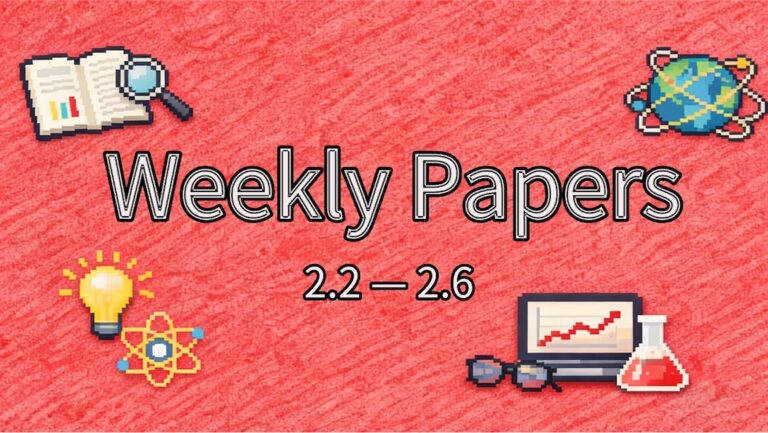Command Palette
Search for a command to run...
Fei-Fei Li's Stanford HAI Is Hiring, With Generous Salaries and Sufficient Research Funding
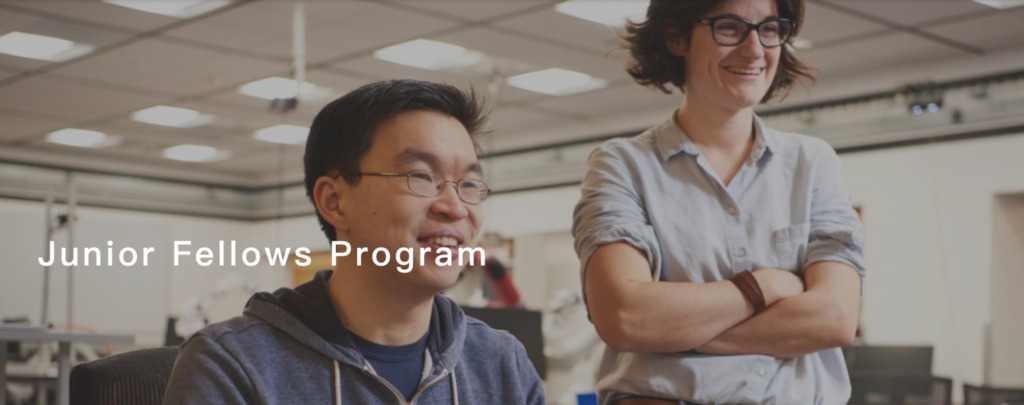
Stanford University's Human-Centered Artificial Intelligence Institute (HAI) recently launched a junior researcher program, offering competitive salaries and generous research funding to selected candidates. Do you want to join?
HAI is looking for assistant professors. Yes, it is the one founded by "AI Goddess" Fei-Fei Li and served as dean.Stanford Human-Centered AI Institute (HAI)
HAI, which has gathered a large number of outstanding scientific researchers, what kind of talents is it recruiting?
Young Researcher Program: Interdisciplinary Research Plus Points
In early September, Stanford University HAI published a job posting for an assistant professor (research direction). HAI calls this talent recruitment the "Junior Fellows Program."
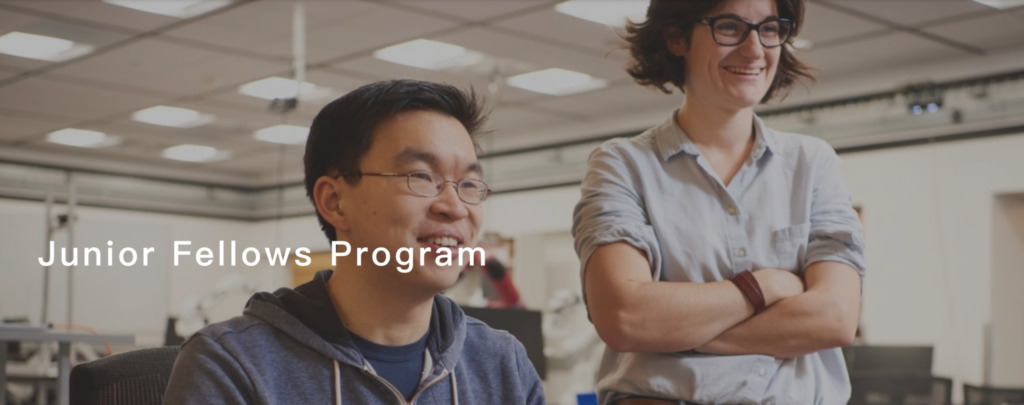
Let's take a look at the "ceiling" of the artificial intelligence industry.What qualifications should applicants have?
- Applicants must have obtained a doctoral degree prior to appointment;
- Applicants must have a strong commitment to teaching;
- Applicants must have outstanding research performance;
- Applicants must teach one graduate or undergraduate course each year;
- In addition to fulfilling the responsibilities of a Stanford faculty member, HAI also encourages applicants to actively participate in HAI's community activities.
The application materials that applicants need to prepare include a cover letter, a resume, a research statement, published works, and a recommendation letter. For specific requirements, please refer to the recruitment homepage:
https://academicjobsonline.org/ajo/jobs/16840
The recruitment notice also emphasizes that as an AI research institute that supports interdisciplinary/field research,HAI is particularly interested in talents conducting cross-border research in AI.Cross-disciplinary disciplines include, but are not limited to, humanities, business, education, law, medicine, physical and social sciences.
This recruitment is open to researchers in all AI-related research fields, without restrictions on country, race, gender, religious beliefs, etc.The selected candidates will take office in September 2021 for a total of five years.

As early as last February, when HAI was first established, HAI publicly recruited its first batch of researchers. This "Junior Researcher Program" is the second time HAI has opened an application channel for this position.
Currently, according to the HAI official website, there is only one junior researcher who has been appointed: Johannes C. Eichstaedt.

Johannes C. Eichstaedt is a computational social scientist.He applies natural language processing and machine learning to social media data to study and measure the psychological states of large groups of people.For example, using media data from Facebook and Twitter to measure the psychological states of large groups of people and individuals to determine the thoughts, emotions, and behaviors that lead to illness, depression, or happiness.
What is the attraction of HAI Institute?
Stanford University has always been a leader in the field of artificial intelligence, and HAI is a long-term plan of Stanford University. Stanford University has provided great support to HAI in terms of both human and financial resources. Therefore, we can compare HAI to the "ceiling" of the artificial intelligence field, and its appeal comes from many aspects.
The job posting states that becoming an HAI Fellow will be an extraordinary springboard for a young researcher to start his or her career.HAI provides generous research support, opportunities for engagement with students, and a low teaching load.
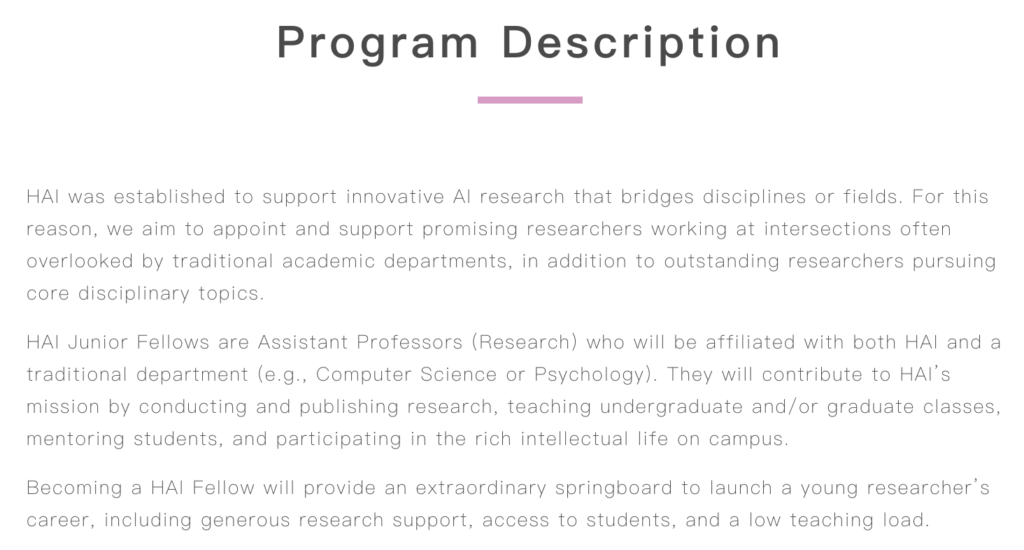
also,Fellows will also receive a competitive salary and sufficient budget for research and entrepreneurship.
It can be seen that the opportunities provided by HAI are extremely attractive, whether in terms of salary level or career development prospects.
It is understood that HAI is currently composed of about 200 faculty members from seven colleges of Stanford University, bringing together researchers from multiple disciplines such as computer science, neurobiology, economics, and philosophy.
If you join, you will have the opportunity to work with outstanding big names such as Fei-Fei Li, so are you tempted?
HAI: What have you done in the past year and a half since its establishment?
HAI was founded in March 2019 and is co-directed by Stanford University artificial intelligence scientist Fei-Fei Li and philosophy professor John Etchemendy. It is committed to promoting interdisciplinary collaboration in the field of artificial intelligence and achieving the mission of "AI for the benefit of humanity."

According to Fei-Fei Li, the birth of HAI comes from three concepts:
- The development of AI should be guided by its impact on human society;
- AI should augment human skills, not replace them;
- Artificial intelligence should incorporate more of the diversity, differences and depth of human intelligence.
Today, HAI, which has been established for a year and a half, is indeed conducting research, education and promotion of AI policies around these three concepts.
Research: Focus on the impact of AI on humans
In terms of research,HAI focuses on three aspects: the impact of AI on humans, enhancing human capabilities, and intelligence.
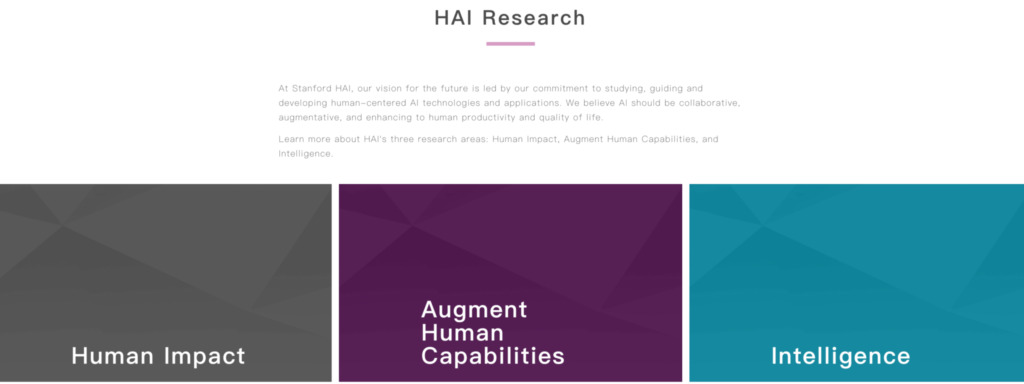
As the novel coronavirus swept the world this year, HAI immediately invested in research on how to combat the pandemic with technology.
On April 1, Fei-Fei Li proposed the concept of a home AI system at HAI's "COVID-19 and AI" live event, which can track residents' health and monitor COVID-19 symptoms while protecting privacy.
This is a typical example of HAI's interdisciplinary research, where a team of clinicians and computer scientists use AI to help the elderly cope with acute epidemics, thus benefiting humanity.
Education: Combining Technology and Humanities
HAI's curriculum design is also centered on interdisciplinary and cross-disciplinary fields, focusing on the integration of science and humanities.There are courses with purely technical content, as well as courses on the principles of AI, the politics of algorithms, ethics, etc.
For example, from the course designs such as "Artificial Intelligence Benefits Society" and "AI Activism Art", it can be seen that HAI's education on AI is different from the early days when it focused solely on technology.
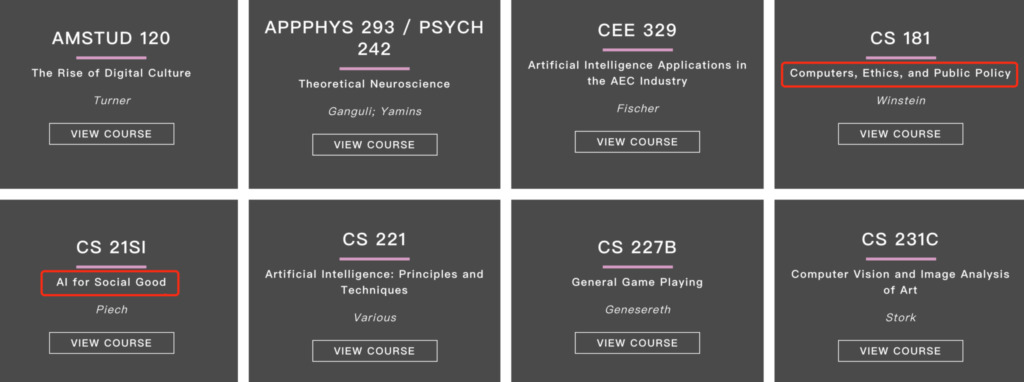
Policy: Make every effort to promote AI policy reform
Since its inception, HAI has taken advantage of opportunities to convene government leaders to discuss the societal impacts of AI. By working directly with government officials and civil society organizations, HAI is working to ensure best practices in AI.

HAI’s annual Ethics, Policy, and Governance conference has become a forum for discussing the transformative impact of AI.
HAI, which was established only a year and a half ago, is setting sail and will surely bring more people-oriented technologies in the future and bring innovation to the thinking of the artificial intelligence community.
-- over--




